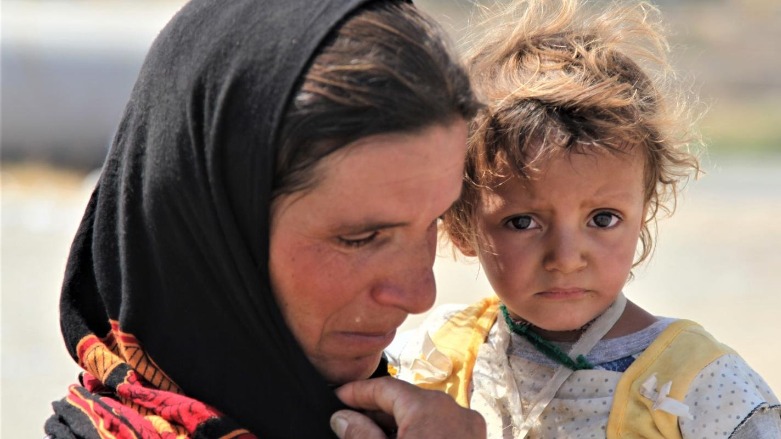Few Yezidis have returned to Sinjar since 2014 ISIS takeover, 2,763 remain kidnapped: KRG

ERBIL (Kurdistan 24) – On the seventh anniversary ISIS' horrific 2014 attack on Yezidi (Ezidi) majority areas in the disputed Iraqi district of Sinjar (Shingal), the Kurdistan Regional Government’s (KRG) office dedicated to rescuing members of the minority religious community announced on Monday that far less than half of those displaced had returned to their home towns and villages.
Of those who have returned to Sinjar, large portions of which was reduced almost entirely to rubble, poor security, and almost nonexistent public services or employment have caused many to flee again to displacement camps in the Kurdistan Region they thought they had left behind.
Read More: Poor security, services in Sinjar force 95 Yezidi families to return to Kurdistan Region camps
"There were about 550,000 Yezidis (in Sinjar before the attack), and an estimated 360,000 have fled the city of Sinjar following the ISIS takeover on Aug. 3, 2014," read a statement from the Kidnapped Yezidi Rescue Office, which pointed out that "only an estimated 150,000 individuals returned."
"The number of martyrs in the first days of the ISIS invasion was 1,293, resulting in 2,745 orphans," it explained, adding, "the number of mass graves discovered in Shingal so far is 82 mass graves, in addition to dozens of individual gravesites."
Additionally, the statement reported, "The number of religious shrines and memorials bombed by ISIS has reached 68 and the number of those who migrated outside the country is estimated at nearly 100,000 people."
The 2014 ascendance of ISIS and its subsequent violent assault on Sinjar led to the displacement of hundreds of thousands of Yezidis. Most of them fled to the autonomous Kurdistan Region, while others resettled to neighboring countries in the region or to Western states.
Others were not as lucky and remained stranded in the warzone, where they were subjected to atrocities and mass executions at the hands of the extremist group for years. ISIS militants forced women and girls into sexual slavery; kidnapped their children; forced religious conversions; executed scores of men; and abused, sold, and trafficked women and girls across the areas they controlled in Iraq and Syria.
Read More: Yezidis call for mission to find missing women on 7th anniversary of genocide
In July, as the anniversary approached, both the Dutch and Belgian parliaments joined a growing number of governments and international organizations in formally recognizing the actions of the extremist group against Yezidis as genocide.
According to Monday's statement by the KRG's rescue office, the number of Yezidi abductees has reached 6,417 individuals (3,548 females and 2,869 males), while the total number of rescued survivors numbers at some 3,550 Yezidis. These include 1,206 female adults, 339 male adults, 1,049 female children, and 956 male children.
"The number of those who remain kidnapped is now 2,763, 1,293 of them females and 1470 males."
These, said the office, are "a result of heinous crimes committed by the terrorist organization ISIS against the Yezidis since Aug. 3, 2014."
Yezidi activists on Monday called on the international community to help bring missing Yezidi girls back home.
"I have a message on behalf of the Yezidi women and girls who are still held in captivity: They are held in ISIS captivity today, mostly in Syria, Turkey, and Iraq," Pari Ibrahim, Executive Director of the Free Yezidi Foundation (FYF), said during a panel on the seven-year commemoration of the genocide.
"While efforts continue to identify and rescue them, progress is slow," she explained. "We will never give up searching for them. And today, we are calling on the world to craft a serious plan to bring back our Yezidi women and girls."
"It has been seven years since they were abducted," Ibrahim concluded. "The world must help us bring them home."
Editing by John J. Catherine
